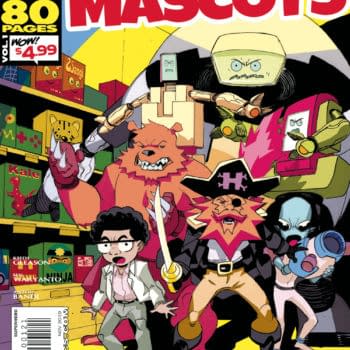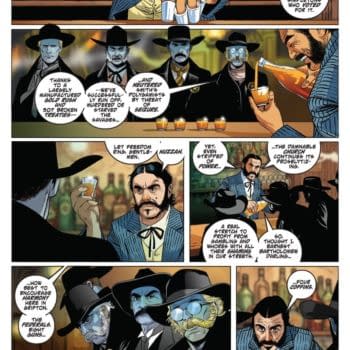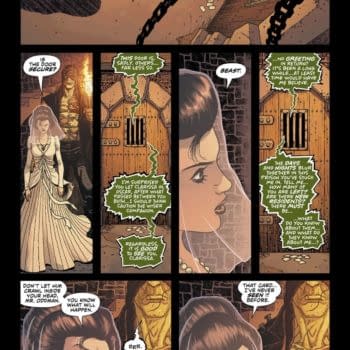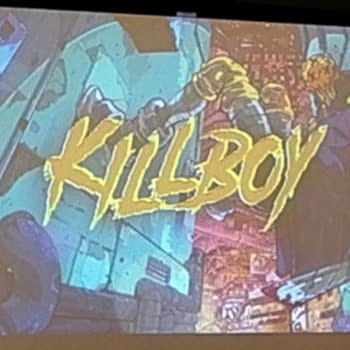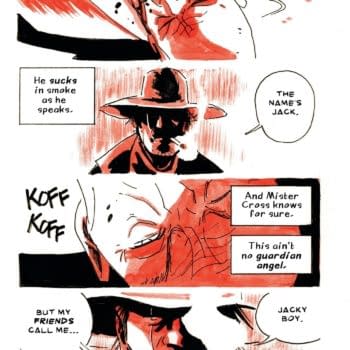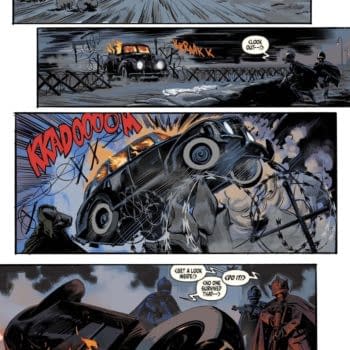Posted in: Comics, Recent Updates, san diego comic con | Tagged: annihilator, anti-heroes, Batman, Comics, entertainment, frazer irving, grant morrison, legendary, san diego comic con, science fiction
The Super-Dark, Super-Heavy Annihilator – Grant Morrison In The Bleeding Cool Interview At San Diego Comic Con
Annihilator, a six issue series by Grant Morrison and Frazer Irving, arrives from Legendary on September 3rd and that team up alone is a significant point of interest, but it's also true that in the past year Morrison has been working on a number of quite diverse creative projects "tailored" to different genres and readerships via several publishers, and this will be the first to arrive, unveiling just what he's been up to in past months. And what he and Irving have been up to is creating something "super-dark" that plumbs the depths of the anti-hero figure, a trajectory established, according to Morrison, by their work on Batman together.
With Annihilator, they delve into the appeal and role of the ultimate poet, artist, thief and definitive "bad boy" Max Lomax, who appears to have existed for at least a couple of hundred years in multiple forms throughout creative works of the 20th and 21st century. Down and out screenwriter Ray Spass, given his last chance on a film project finds himself writing a script for a film, Annihilator, encounters the film's "open-sourced" character Max Nomax in real life, and is given the mandate to help Nomax recover his memory and identity in the seven days before all hope is lost, both for Spass, who is dying from a brain tumor, and for Nomax who must unravel why he's guilty of the "ultimate crime" in his universe.
Irving's artwork on the book as revealed so far is haunting, washed with the strange sepulchral evening light of Sunset Strip in the story's Hollywood setting, and together Morrison and Irving have created something memorable and unsettling: an intricate story that might explain our own cultural obsessions with dark vigilante anti-heroes.
Bleeding Cool had the remarkable opportunity to sit down with Morrison at San Diego Comic Con and talk about Annihilator. And what we encountered regarding the book was fairly "mind blowing", a story super-dark, super-heavy, but not without humor in the face of the human condition.
Bleeding Cool: So, I've only had a little bit of a look at this book Annihilator. Of course, the artwork is amazing.
Grant Morrison: Oh, Frazer [Irving] is the best. And even he likes it. He always says he hates his work, and this is the first time he's looked at it and loved it.
BC: It feels really unchained. It's just very expansive and seems to flood the page.
GM: It was designed for him. I didn't want anyone else to do this.
BC: You guys have worked together a lot in the past.
GM: Pretty much. It wasn't until Klarion in Seven Soldiers that we really got a chance to do something. I've loved his stuff from when he got started in 2000AD. I've always been trying to find a project for him. And obviously we did the Batman stuff together, and with this, I wanted to do something darker than Batman with Frazer, kind of plumb some of the same veins of the antihero and the diabolical hero.
BC: My first encounter with this book was seeing the poster at the Legendary booth on the show floor at San Diego Comic Con and I kind of stopped and stared at this cover image. I saw in the teaser that it says "One man's mind is the most dangerous place in the universe". It made me think of this quote from the Dalai Lama that every man is the center of his own universe. So, is it kind of like the central character's universe, and his ego is capable of devouring all the other ones?
GM: It's the idea that Ray Spass is a difficult man, who does a lot of drink and drugs, and he's got one last chance. He's been a successful screenwriter but he's kind of blown all the money and he's given one last chance to make this huge tentpole property called Annihilator. And Annihilator's based on this open-sourced character called Max Nomax. He doesn't actually exist.
BC: Open-sourced as in free on the internet, kind of like fan fiction?
GM: Yeah, but he doesn't exist. The idea is that this is a character that's been around since 1910 basically, and he's been through a bunch of different iterations, but nobody owns it. Nobody knows where it came from in the first place. But now they want to make this movie based on it and they hired Ray to write it so as he starts to write, things start to go a bit crazy. So it's about a notion that in a writer's head we are both creators and destroyers of universes and what would happen if that became literalized.
One of the ideas I wanted was that of the dark man, the Byronic hero, which we were interested in doing for Batman. So I started to look at instances of that character going all the way back. Something like Fantomas, who inspired the surrealists, so I thought, let's make a character like Fantomas and pretend he's always existed. And so that's what the Nomax character is, and he's been through a bunch of different iterations, so we created a whole series of Nomax book covers, based on all the different novels. And then again in the 1950's, he's written by a Communist screenwriter called Bernie Bloch, who doesn't exist again, but he's kind of based on Ben Hecht, who wrote some decadent novels called The Kingdom of Evil and Fantasia's Malady. So, I thought, let's do something with that as well and link all these characters.
So then we go to the 1970's version, who is inspired by the Italian Fumetti magazines, like Diabolik, Criminal, and Sadistik, so that brings in a different version of Max Nomax. So basically Ray Spass is using all this different material that we created and has to make a project out of this surrealist thing. And then he discovers, of course, that in the midst of writing, he has a brain tumor. And at that moment, his character Max Nomax turns up and just basically says, "It's not a brain tumor. It's a package of information I've filed into your head. It's my entire biography which I now can't remember. So the only way for me to remember is for you to write, and as you write, the tumor will shrink, so the only thing that will save your life is to finish your screenplay in seven days". And they kind of go on the run together to finish this screenplay, being hunted by all kind of forces from cops to Archangel Annihilators from another universe.
BC: I like how you say that like it's just normal!
GM: Those guys again? (laughter) And you know I've done stuff in the past like "Is it or isn't it?" Is he hallucinating? Like in Joe the Barbarian. But in this one he's not hallucinating. He's actually meeting this character who turns out to be more real than he is in a lot of ways.
BC: Is it giving too much away if I ask, "What is he?"
GM: Nomax? Basically, he comes from another universe that's ruled by a supercomputer called VADA, which is the "vast artificial development authority" and he's the greatest rebel in this world, he's the ultimate artist, the greatest escape artist, the criminal of criminal. The kind of bad man. Just all of those anti-heroes. He's a poet, and artist, and he's kind of thorn in the side of this VADA. Also, he has a bunch of characters called Annihilators, who go and do his bidding.
BC: So, Spass seems somewhat superficial. Is he someone who had a lot of potential, but has just wasted it?
GM: Yeah, utterly superficial. The whole underpinning of this is me trying to talk about Los Angeles, because we've had a house based in Los Angeles for the past 5 years. And you know the surface of Los Angeles is quite shallow, though once you meet friends and have a network there, I think it's an amazing, creative place. But I did want to talk about the way Los Angeles appears and the way it's presented to the world. And also what it actually feels like. Because Los Angeles is a very witchy, satanic city. It's the Anton LaVey stuff and the Church of Satan stuff, and Manson, so it's got a very dark, occult undercurrent and that's where the basis of this came from, trying to capture that feeling. And show how it might affect the people who work there and write there and what they are actually dealing with.
BC: What sort of effect is this going to have on Spass? Is it just about saving his physical life? Because his life was missing something, clearly.
GM: There's a lot more to it than just saving his physical life, but that's his immediate concern. Because he's dying of a brain tumor. But he's a fallen man as Nomax never tires of reminding him. And because Nomax is trying to learn about himself through Spass' work, because he doesn't know who he is until Spass writes it down, he's quite shocked by what is revealed. And as we go through, it's basically about these two men, and one of them is this fantastic Byronic hero and the other is a sex-mad screenwriter who's on his last chance. And both of them aren't necessarily nice people. So it's what we learn about both of them as Spass' work continues. It's about what happens if someone starts to tell you about your biography and your biography reveals that you're not really a nice guy at all. So both of them go through a bit of learning in this.
BC: So, do I hear a bit of detective and noir influence in there?
GM: There's a bit, but a modern noir really. Not a 40's New York noir. We've got this orange light shining that just kind of suffuses everything in LA and the hotels and the bars. It's really the color palette that Frazer is using that's amazing–these burnt out oranges and pinks, and then when you cut to Nomax's world, which has been revealed through the screenplay, everything's these cold blues. Because his story is that he's been imprisoned on a space station orbiting a black hole at the center of our galaxy. In the center of the galaxy where we live, there is actually a black hole which is called the Great Annihilator. It's about that also.
The book's about a bunch of different things, but it's about this black hole which sits at the center of our entire existence. And the idea that all creative people basically work around this void and try to make sense of it, and the void is either death or a kind of nihilistic hopelessness that lies in the fact that our universe is going to be swallowed in the end. We all live spiraling around a plug hole in the galaxy we're in. And I wanted to tell the story of that. What are we doing when we create? We're spiraling and going around a hole, and trying to make meaning of an emptiness, but by making a meaning, we start to see the shape of what's in there. The movement we make around it, shows us the shape of the object. So, it's a kind of meditation on nothingness, and finding a way to make that exciting.
So, as I say, Nomax has been imprisoned, and apparently it's for the ultimate crime which we don't quite know until it's slowly revealed. But in his imprisonment, he's been accompanied by this girl who's preserved, a dead girl who's preserved in a giant egg. So, it's clearly got something to do with her, what he's done.
BC: So, that's his clue? Is it something to do with what he's done that causes him to lose his memory, or part of the punishment?
GM: No, he doesn't have his memory because he's come to our world through the black hole.
BC: Oh, right. Because no information can be conveyed through a black hole.
GM: That's right.
BC: And this is 6 issues? That's a massive story to tell in 6 issues.
GM: Well, it's 32 pages each. And the actual story is quite linear. It's just these guys running around for 7 days trying to get a screenplay done while they are being hunted.
BC: I saw on one page from the comic one thing mentioned, when there isn't much text on the teasers otherwise. It said: "A cure for death". How does that play into all this?
GM: Well, that's what Nomax's plan is, not only that, but he's also got this girl in the tank, and he's trying to bring her back to life. And clearly he's had something to do with the fact that she is dead. And we slowly learn what she is, who she is, and why this is the worst crime anyone has ever committed in the history of humanity. So, what he's basically trying to do is his greatest artwork. And it's going to involve this dead girl and this black hole and a cure for death.
BC: Why are Nomax and Spass given only 7 days to do all this?
GM: Because they are being hunted and VADA can create and destroy a universe in 7 days. The more I talk about it, the more you might start to discern some Biblical threads running through it.
BC: So, if VADA can destroy a universe in 7 days, is he already destroying things on earth to try to get Nomax?
GM: Yeah, he starts to. And you find out why he's quite happy to destroy the universe as we perceive it. But we see that he's sent these Annihilators, and his major Annihilator, into this world to hunt Nomax and to find Spass and stop them from actually finishing the story. Because when they finish the story, they find out exactly who Nomax is, and what he has to do next.
BC: Which is the biggest danger. Knowledge is power?
GM: Absolutely? Isn't it always? Knowledge is also dismay. The more you learn, the more you didn't want to know.
BC: Well, this is super dark, really.
GM: Yes, that's what we wanted after Batman. Working with Frazer, we said "Let's take it to another level. Let's dial it up. Let's create this ultra-violet super-dense character". So, even one of the episodes is called "Super-heavy Falling Star", which is Nomax's description.
BC: Why did both you and Irving want to go somewhere this dark at this point?
GM: To me, it felt like culture is obsessed with this kind of stuff right now. The fact that Batman is basically pop culture's greatest hero right now says a lot about how we feel about the fear of the future and the way things have gone since September 11th when things got a bit more scary in the world and travel got more difficult and the sense of threat was raised. It was clear that people are very interested in the dark, and zombie things, and that sort of stuff, so for me it's about not running away from something. I wanted to see what I could explore and ask, "Can we create the darkest pop culture character of all?" And when I say "dark", I mean you don't even know until the end what this character really is.
BC: He could be like the sum of all evils?
GM: He could be the devil himself.
BC: So, descending further and learning more about him could mean we become even more unnerved by what we learn.
GM: You know, if you think about Milton, and ask, "Who is the greatest rebel? Who is the greatest anti-authoritarian figure of all time?" And the Gnostic stuff is like that as well, where the Devil gets more of a starring role.
BC: If you take this as far as it can go in terms of darkness, do you see yourself having to "cleanse your palette" afterward? Is this going to be pretty heavy for you?
GM: Fortunately, it's funny. I think if you're going to go into the darkness in the way that we did in the way that we did with The Filth, it has comedic elements. So what we did is make this kind of buddy relationship between the pair of them and it's quite ridiculous. It's these two basically insane men goading each other into feats of greater and greater ridiculousness. So, we're kind of leaving the darkness with humor, which I think is the only thing you kind of can do. It's a big story, and even though it is dark, it's also funny.
And as for palette cleansers, I've been doing a bunch of creative stuff. Last year, I disappeared for awhile and didn't have anything published and in that time I've just been writing a bunch of stuff for different companies and tailoring it to the different strategies of all these different companies. It was fun for me to do. But among all that, there've been palette cleansers. But even some of the stuff I've done after Annihilator is even darker. It opened up a whole new pit of nihilistic horror that I've never quite explored before! It seemed worth jumping in. (laughter)
BC: Can you tell me a little bit more of what you feel that Frazer Irving particularly brings to this?
GM: Everything. The project was designed for him. I couldn't imagine anyone else drawing it. It took us awhile to get everything organized. He was working on other things, X-Men and stuff, and he was quite slow to get started on it. But he's really banging through the book now and honestly, no one could do it like him. He's one of our greatest, rarest, most unique talents. And I wanted to write something that was very specifically designed for his capabilities and what he's capable of doing. So when he starts to get into these two characters, in particularly the acting he does, you see he's so great with hand-gestures and body language. And he really brings it to life.
BC: Because of the painterliness of his work, there's something that seems so realistic about it, even though he's dealing with very fantastic things. And I wondered if you thought that was necessary, that realism when dealing with fantasy?
GM: Definitely. And because, as well, Legendary is most known as a movie company, that's why this is my story about about a movie, about Los Angeles…
BC: I was wondering that!
GM: Yeah, it's part of the whole thing. That's why it's a tailored project. It's for Legendary and it's about movies, about movie making, about screenwriters, about adaptations and the way things can be transformed into Hollywood. And it's set in Hollywood, so that's what it's really all about. The Hollywood experience. So that's why we wanted that realistic art. It looks like a movie. A heightened movie. The sort of things only a comic can do. That's the thing about Frazer–he paints with light.
BC: And I noticed a kind of "wide-screen" effect on some of the art. He can presumably bring you Hollywood in the sense that you feel like you're there.
GM: Well, he hasn't even been in Hollywood, but the way he captures the light is just beautiful. When you spend some time there, there's a very specific light. This kind of orange glow that comes down Sunset Strip. He's done these scenes with that kind of light coming through curtains and coming through other things…
BC: "Crepuscular"? Is that the word? That's the word the writers of the period you were talking about use.
GM: Yes, that's the very word. That was a very popular word back then. It's a big, sci-fi epic. And I hadn't done science fiction for awhile, so I wanted to do a sci-fi story, but grounded in the real world. And there are places you can actually visit in there. So we've tied it very closely to the real world, and that's why the artwork looks so good.
BC: The promo asks, "Can he keep from blowing his mind?" regarding Spass. Well, consider my mind blown, since I didn't know much about this book, and it keeps unfolding and unfolding.
GM: Well, that's what we want. We wanted it to keep opening up. And every time you think you've got what's happening with these characters, suddenly something new happens.
BC: I have the feeling that this book is definitely going to leave readers with questions in their own minds about the nature of reality.
GM: I hope so. That's my plan. I've always wanted to leave them with questions about reality.
Annihilator #1 arrives on September 3rd from Legendary.






